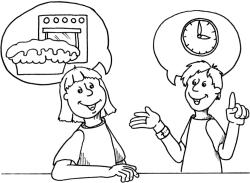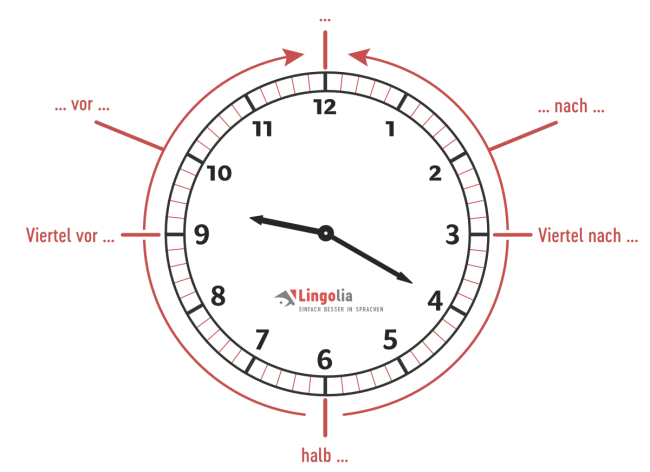Telling the Time in German

Telling the time in German. There are different ways to tell the time in German. The 24-hour clock is used for official information (e.g. programmes, timetables), but in spoken language, we also use the 12-hour clock.
Read on to learn how to tell the time in German,
Example

– Ist der Kuchen fertig?
– Nein, er muss noch 45 Minuten backen .
– Wie spät ist es jetzt?
– Es ist Viertel nach drei.
– Gut, dann können wir ihn um vier essen .
– Nein, dann ist er noch viel zu heiß! Frühestens Viertel nach vier kannst du ein Stück probieren .
Telling the Time in German
There are two ways to say the time in German: the 24-hour clock is used in more formal contexts, whereas the 12-hour clock is used in more day-to-day situations.
| Formal | Colloquial | |
|---|---|---|
| 6:00 | sechs Uhr | um sechs |
| 6:05 | sechs Uhr fünf | fünf nach sechs |
| 6:15 | sechs Uhr fünfzehn | Viertel nach sechs (viertel sieben*) |
| 6:20 | sechs Uhr zwanzig | zwanzig nach sechs |
| 6:30 | sechs Uhr dreißig | halb sieben |
| 6:40 | sechs Uhr vierzig | zwanzig vor sieben |
| 6:45 | sechs Uhr fünfundvierzig | Viertel vor sieben (drei viertel sieben*) |
| 6:50 | sechs Uhr fünfzig | zehn vor sieben |
* only common in certain parts of Germany (eastern Germany) and in Austria
The German clock
To ask for the time in German, we use the following question:
Wie spät ist es? – Es ist …

Formal version
In formal situations, we first say or write the hour followed by the word Uhr, then add the minutes.
- Example:
- 10:30 → zehn Uhr dreißig
When you tell the time this way in German, it’s common to use the 24-clock. This way you can avoid misunderstandings, and it’s always clear whether an event takes place in the morning or the evening.
- Example:
- 18:57 → achtzehn Uhr siebenundfünfzig
Colloquial version
In everyday language, we can also use the colloquial version of telling time, especially if we don’t need to be precise.
- Example:
- 08:15 → Viertel nach acht
10:30 → halb elf
12:50 → zehn vor eins
When telling time this way, we can only use the 12-hour clock. In order to avoid misunderstandings, we can specifically indicate the time of day we’re talking about (morgens, vormittags, nachmittags, abends, nachts).
- Example:
- 18:30 → (abends) halb sieben (not:
halb neunzehn)
Important Expressions
| German | English |
|---|---|
| Wie spät ist es?/Wie viel Uhr ist es? | What time is it? |
| Es ist zehn Uhr. | It’s ten o’clock. |
| Es ist Viertel nach elf. | It’s quarter past eleven. |
| Es ist einundzwanzig Uhr vierunddreißig. | It’s nine thirty-four. |
| Wann treffen wir uns?/Um wie viel Uhr treffen wir uns? | When are we meeting?/What time are we meeting? |
| Wir treffen uns um acht. | We’re meeting at eight. |
| Wir treffen uns (um) halb neun. | We’re meeting at half past eight. |
| Wann fährt der Zug ab? | When does the train depart? |
| Der Zug fährt um sieben Uhr ab. | The train departs at seven o’clock. |
| Der Zug fährt (um) sieben Uhr achtundzwanzig ab. | The train departs at seven twenty-eight. |
| Wann beginnt der Unterricht? | When does the lesson begin? |
| Der Unterricht beginnt um neun. | The lesson begins at nine. |
| Der Unterricht beginnt (um) sieben Uhr fünfzig. | The lesson begins at seven fifteen. |
| Der Unterricht beginnt fünf (Minuten) vor (um) acht. | The lesson begins at five (minutes) to eight. |




























